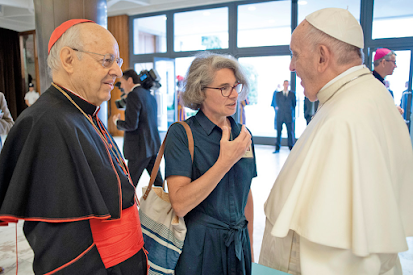Circularity, a new concept in ecclesiology, doing the rounds in Church circles.
'The signs of a change in mentality in the Church are already visible,' Cardinal Mario Grech, the synod's secretary general, said cheerfully at a press conference in the Vatican on Friday afternoon. 'The important thing is that we have shown and continue to show that the way of the Church begins and draws strength from listening.'
This press conference concluded the first phase of the synod launched by Pope Francis. All over the world bishops have listened to their faithful and national syntheses have been drawn up by all 114 bishops' conferences. More than a hundred of them have already reached Rome.
A group of 25 experts from all parts of the world has been asked to draw up a summary document for each continent. It is an innovative process, not to say pioneering: it is something that has never been done before,' said Jesuit Giacomo Costa. He heads the task force that is to write the summary documents for a second, continental phase.
Between the Diocesan or national level and the universal level, Pope Francis has inserted a regional level, a novelty in Catholic tradition. The document for this phase, according to Costa, must 'collect all the voices, but also choose or distinguish the focal points'.
At the press conference on Friday, a new word popped up in Vatican parlance: circularity. The two-year Synodal process is not a simple straight line from bottom to top, from the local community, via the Diocese, the Bishops' Conference and a continental assembly to the universal Church. It is not simply passed on from bottom to top, but the Vatican has devised a completely new method.
This method of discernment should prevent the Synod and its themes from being 'hijacked by anyone but the Holy Spirit', as Cardinal Grech replied to a question from a Spanish journalist.
What is happening? The document for the continental second phase, which will be ready at the end of October or beginning of November and will summarise the experiences of all the countries on the continent in question, will be returned to the dioceses. 'Out of respect for the participants in the first phase,' Grech said.
The intention is that the Catholic faithful will be trained even further in listening. In the first phase, they listened to fellow believers from their own parish, diocese or country. In the second phase, Catholics are invited to listen to the concerns of fellow believers in other parts of their continent.
According to Cardinal Grech, 'every bishop is obliged to bring the document to the attention of his Church'. Responses are sent back, either to the Bishops' Conference or to what is called the 'continental assembly', a new body to be set up. This 'circularity between the levels of ecclesial life' should, according to Grech, lead to a 'Synodal style' which the Catholic Church is increasingly seeking to make her own.
The Continental Assembly, in which delegates from the entire People of God and not only the bishops will participate, will take place from 5 to 12 February 2023 in the Czech Republic, Europe's most secularised country. A continental assembly of Bishops will 'validate' a final text and send it to Rome.
When the Catholic faithful discover something, you cannot exclude that the Holy Spirit wants to say something with it'.
Then the third phase begins: on the basis of all seven continental texts (Asia is divided into the Middle East and the rest), a Working Document will be drawn up for the Synod of Bishops in October 2023.
Cardinal Jean-Claude Hollerich of Luxembourg, who will serve as Secretary at the Synod of Bishops in October 2023, called the "enthusiasm and creativity" shown in the first phase impressive. 'Reading these summaries gave me great comfort as a disciple of Christ and also as a Bishop, and hope,' he said. 'This hope must now be transformed into missionary dynamism.'
Hollerich spoke of 'an ecclesial dialogue without precedent in the history of the Church, not only in terms of the number of participants - there have been 'hundreds of thousands of meetings at all possible levels and also on the internet' - but also in terms of the quality of participation'. The process was not perfect, but 'we are trying more and more to be a Synodal church and we are learning from our mistakes'.
'The spirit of synodality has taken root in the local churches', said French Sister, theologian and Under-secretary of the Synod, Nathalie Becquart. 'And there is a great desire to continue on this path.'










.jpeg)

Comments